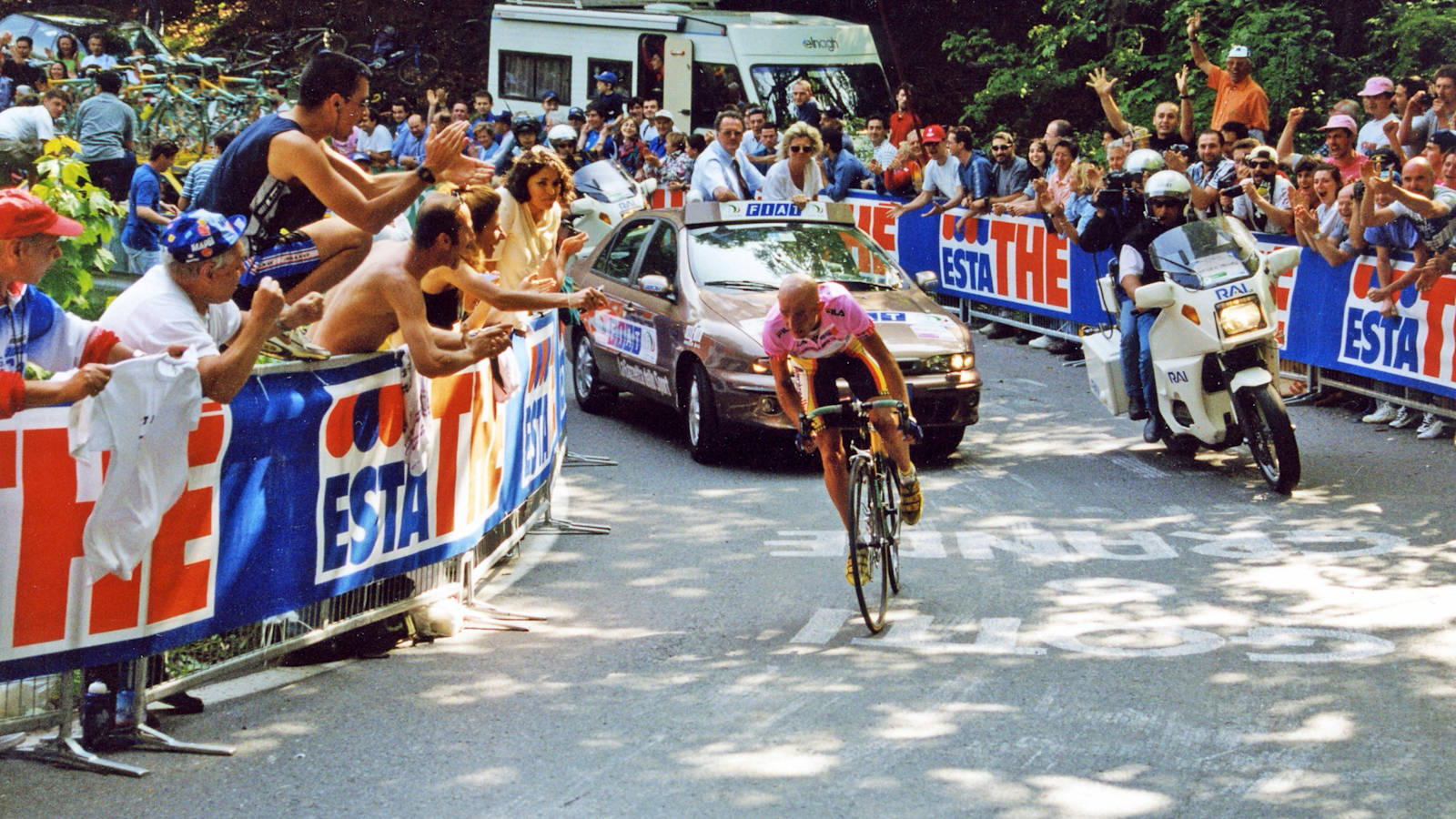OROPA '99
Award-winning sports writer Herbie Sykes flashes back 25 years to Marco Pantani’s most promethean exploit on Monte Oropa at stage 15 of the 1999 Giro d’Italia – the scene for stage two of this year’s edition of the race. He reflects on witnessing firsthand how Il Pirata captivated a nation during cycling’s most explosive era.
18 May 2024
Written byHerbie Sykes
Photography credit Il Biellese
With thanksMarco Pantani Foundation.
We picked Gianni up at Ceva, and he told us there would be a lot of people. When I asked him what he meant by a lot, he said, “a lot!” It was Saturday, it was the first mountain stage, and everyone was waiting. When I asked him what he meant by everyone, he said, “everyone!”
Gianni told us to wait and see, but we didn’t have to wait very long. The motorway started to resemble a cavalcade, and then a float. We were floating towards the Alps, and that had never happened before. It seemed like the entire population of northern Italy had come out, its cycling genome enkindled. There were flag-waving ultras from Bergamo, busloads of housewives from Cremona, generations of cosplaying pirates from Pavia.
“Not since Fausto Coppi had an Italian done the Giro-Tour double, and none of us had been born then.”
As cycling people we’d more or less understood the athletic scale of what Marco Pantani had accomplished, but not the consequence. Not since Fausto Coppi had an Italian done the Giro-Tour double, and none of us had been born then. Besides, we were British. Cycling took place in our country, but it was tiny by comparison. It felt detached from the sporting mainstream, but in Italy it wasn’t like that at all. Bike racing had been bigger than football, and bigger than everything else. It was hardwired into their identity and sense of self, and the Giro remained the sporting metaphor for their 20th century journey. It connected them to their past and to one another.
However the Italians had been losing grand tours – their own grand tour included – for 30 years. Worse still, in recent times they’d been won by a new breed of rider. Most were big, bullying Goliath sorts, anti-cyclists. They’d bludgeon the time trials, sit poker-faced in the mountains, and generally suck the joy out of the racing. Worst of all they were monosyllabic and indescribably dull, so thank goodness for Marco Pantani. With his bandana and gold earring he was Il Pirata and nobody – not anybody – climbed the way he did.
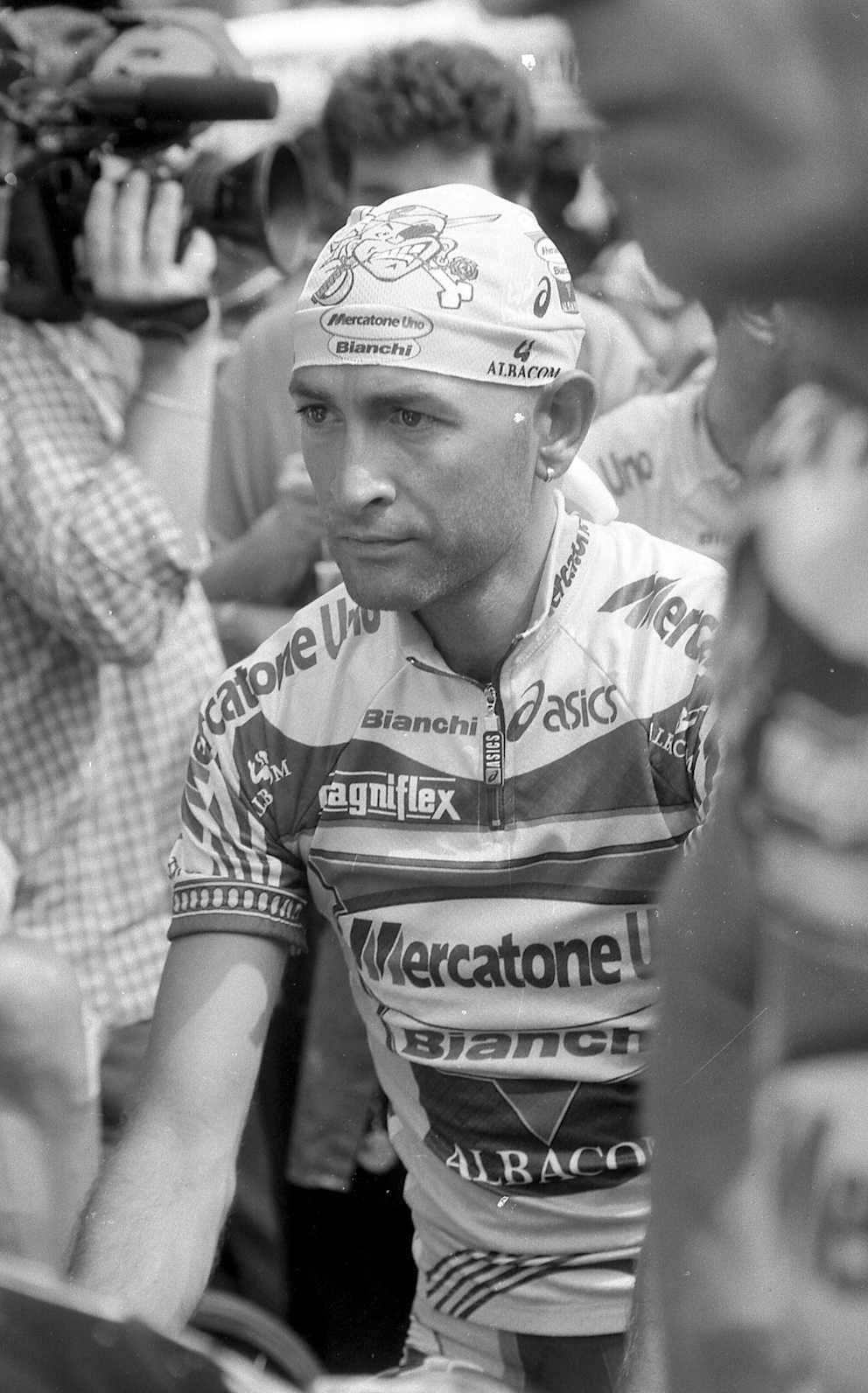
“Thank goodness for Marco Pantani. With his bandana and gold earring he was Il Pirata and nobody – not anybody – climbed the way he did.”
Nobody rode like him and nobody suffered like him either. At the 1995 Milan-Turin, a fool in a SUV had entered the course on the descent of Superga. He’d believed himself smart enough to avoid the riders, but the riders had been doing 80kmph. It had taken them a year to put Pantani back together, but then a black cat had crossed the road in front of him at the ’97 Giro. Another ambulance, another travesty. A black cat. You couldn’t make it up.
Something always seemed to go wrong, but that was entirely the point. Notwithstanding the crashes, the lay-offs and the unspeakable misfortune, he’d refused to be broken. They refused to believe he wouldn’t reach the promised land, and so did he. That was why he kept picking himself up, and that was why they loved him so much. Marco Pantani was of them, but most of all he was for them. Like Coppi, he’d achieved the impossible. Politics had united Italy but he, a humble racing cyclist, had united the Italians.
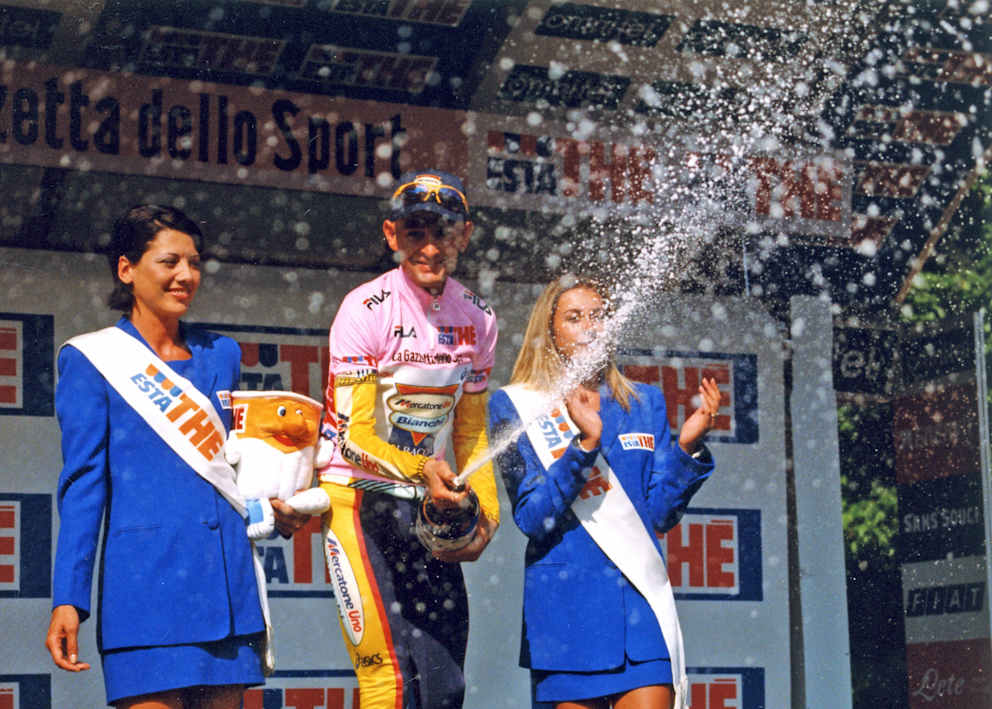
When, therefore, he’d dropped the Russian, Tonkov, at Montecampione in 1998, it had felt like an epiphany. Finally, he’d run out of bad luck and finally a cyclist – a real one – had won the Giro. Fausto Coppi’s maglia rosa had the rider it deserved and so too, when he smashed Ullrich at the Tour of France, did his maglia gialla. What a bike rider he was, and what a human being. What a summer it had been...
Gianni was right. There must have been 30,000 bandanas on that mountain; cycling recast as a cultural phenomenon. By the time he whistled by us he was the virtual maglia rosa, and the roar was unlike anything I’d experienced at a bike race. Mouths were open and mouths were moving, but the sound seemed to emanate from the mountain itself. It emerged from the same place, deep within the Alps, that had conceived Fausto Coppi.
Marco Pantani pulled on the jersey at Borgo San Dalmazzo and so, all across Italy, did Gianni’s “everyone!”. Fifty-seven million maglie rosa.
It took forever to get off that mountain, I suspect nobody really wanted to. It was the best traffic jam they’d ever been in. Gianni told us to remember the date. May 29, 1999.
“There must have been 30,000 bandanas on that mountain; cycling recast as a cultural phenomenon.”
The following day the partenza was in Racconigi, the stage finish on the Holy Mount of Oropa. Our plan had been to give the Giro a miss, to spend a lazy afternoon in Turin and watch it in a bar. We’d a sense that cycling history was being written, however, and Gianni informed us that we couldn’t not go back up the mountain. He said it would be spectacular, and we should try to be a part of it.
That morning we couldn’t get there soon enough and nor, evidently, could the 57 million. The motorway was choked long before the exit.
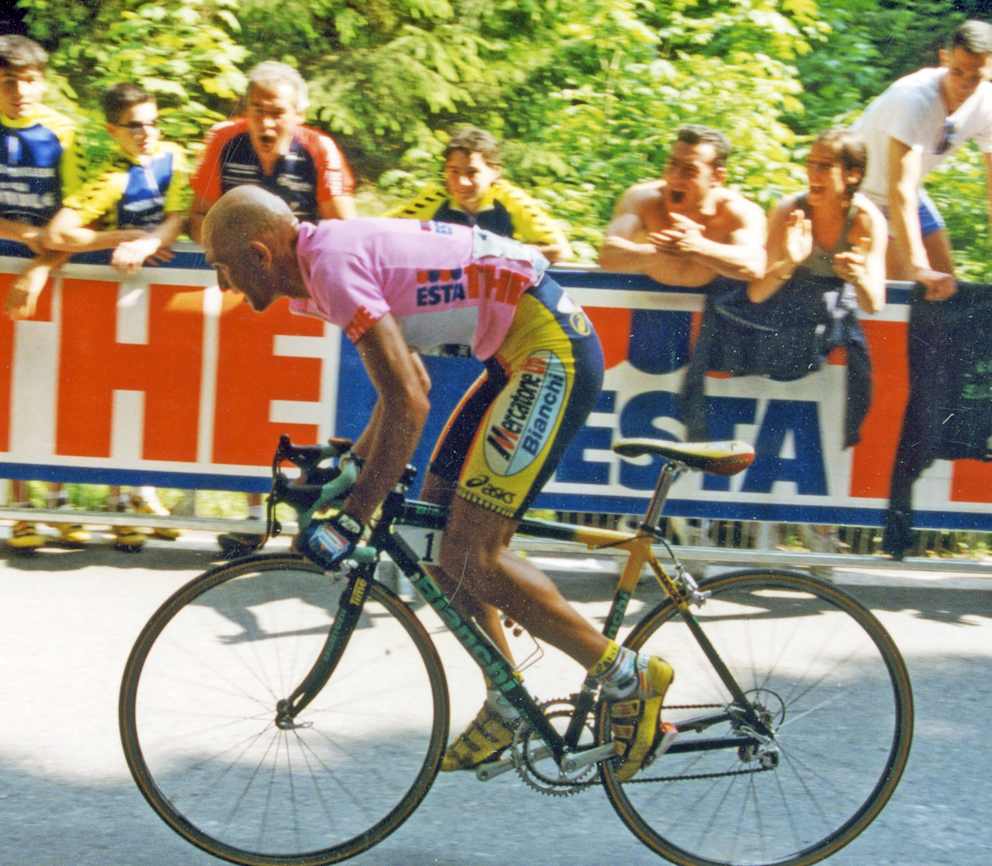
We got to the sign-on far too early, and the bandana-wearing pantanisti weren’t much in evidence. We assumed they were off admiring Biella’s legendary porticoes, or that they’d made straight for the majesty of Oropa. We were cyclists (of sorts) though, and we wanted the proximity. We wanted to experience Gotti, Heras and Jalabert off their bikes as well as on them, to be as close as possible to grand tour bodies. We were joined by a smattering of club riders and appassionati, and by a few pensioners out on their constitutional morning stroll. The unknowns of the Giro began to sign on, though in truth nobody paid them much heed. There was a smattering of applause, but it was perfunctory.
As the moment approached, though, we became a multitude. We started to heave and to surge, billowing this way and that under our own weight like we were waiting for salvation. It took a handful of carabinieri to prise open an aperture. He tip-toed through it and then, amidst this cacophony, it snapped shut.
“It was easy to feel sorry for the rest of the GC group on the road that day. They were some of the best endurance athletes on the planet, and yet his presence ridiculed their talent.”
He was encircled, there was no obvious way out, and the carabinieri were compelled to lever us open again. A critical mass had developed around him now, and a form of veneration.
It was easy to feel sorry for the rest of the GC group on the road that day. They were some of the best endurance athletes on the planet, and yet his presence ridiculed their talent. They were impotent and so the tactic, insofar as one could be deduced, was simply to cling on for as long as possible. Logic suggested he’d go after the paved section at Favaro, about five kilometres from the top. That was where Ugrumov had hurt Indurain, and where Jalabert would be most vulnerable. Nobody was deluding themselves he was beatable, but everyone knew he might be stopped from winning. He was still Marco Pantani and Biella had more than its fair share of black cats.
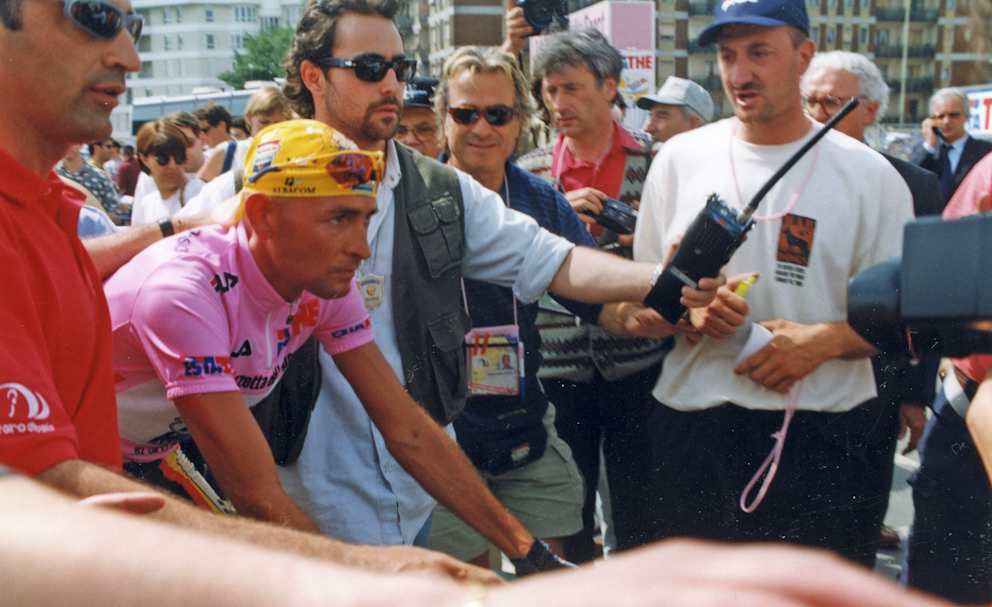
He put them on the front at 10 kilometres, just as the remnants of the break were caught. The obvious pitfalls seemed to have been overcome, but they hadn’t reckoned on Pantani’s law. Unbelievably, he shipped his chain with the race on, and it cost him the thick end of a minute. By the time he remounted there were 49 riders between him and the front, and eight kilometres to race. Heras threw the kitchen sink at it, and Jalabert and Gotti had no choice but to respond.
Zaina and Garzelli – Pantani’s gregari – did what they could. They dragged him across to the GC deadbeats, but with the best will in the world they were never going to get him back to the front. When Garzelli peeled off exhausted, Marco Pantani was alone, yet again, against the cycling Gods.
“When he dropped Jalabert, the last of them, he seemed almost indignant.”
Initially he seemed unresolved, but pretty soon he had it all sketched out. He put himself onto the drops, clicked another gear on and made a start. What followed was a form of uphill slalom. He rode from group to group, rested momentarily, and set to again. The aesthetic was sublime, and he understood this because he’d invented it himself. When he dropped Jalabert, the last of them, he seemed almost indignant. They were supposed to have offered more resistance, but with three kilometres still to ride they’d all capsized.
Six days later he left the race and, to all intents and purposes, the sport.
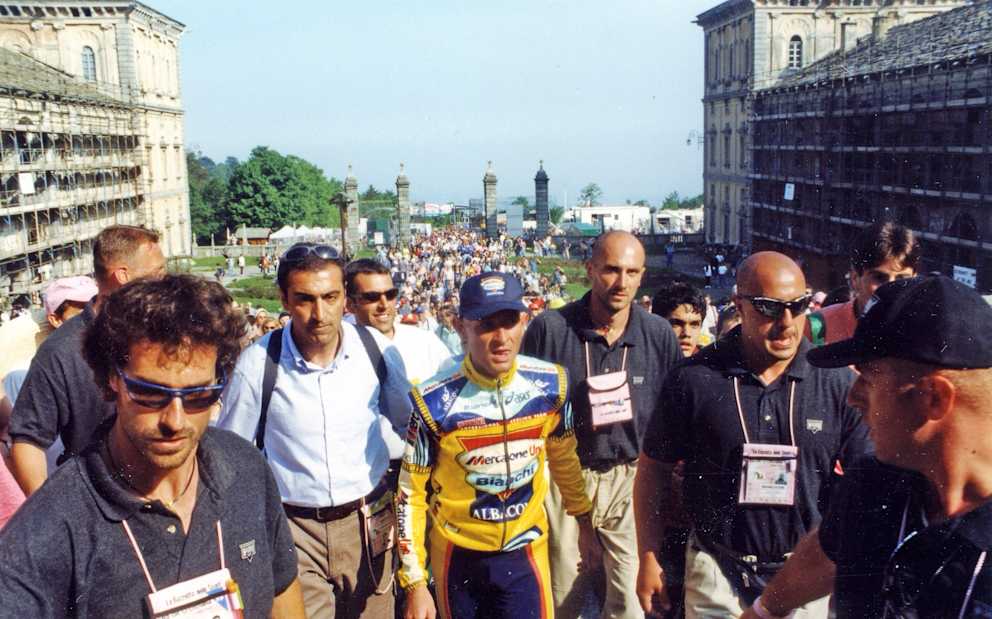
In advance of writing this I called Gianni. We reminisced about this and that, and then I asked him about Oropa. We talked about the maelstrom which preceded it, the drama with the chain, the splendour of the backdrop… I asked him what he thought of the way Pantani rode, but he said I shouldn’t allow myself to get too bogged down in matter-of-fact precepts like “performance”. Oropa, he reasoned, transcended all that. I asked – for old time’s sake – what he meant, and he said that Pantani had been an artist in a cyclist’s body. Oropa, he concluded, had been his last great work. His magnum opus.
Bigger than cycling, and ultimately bigger than him.
